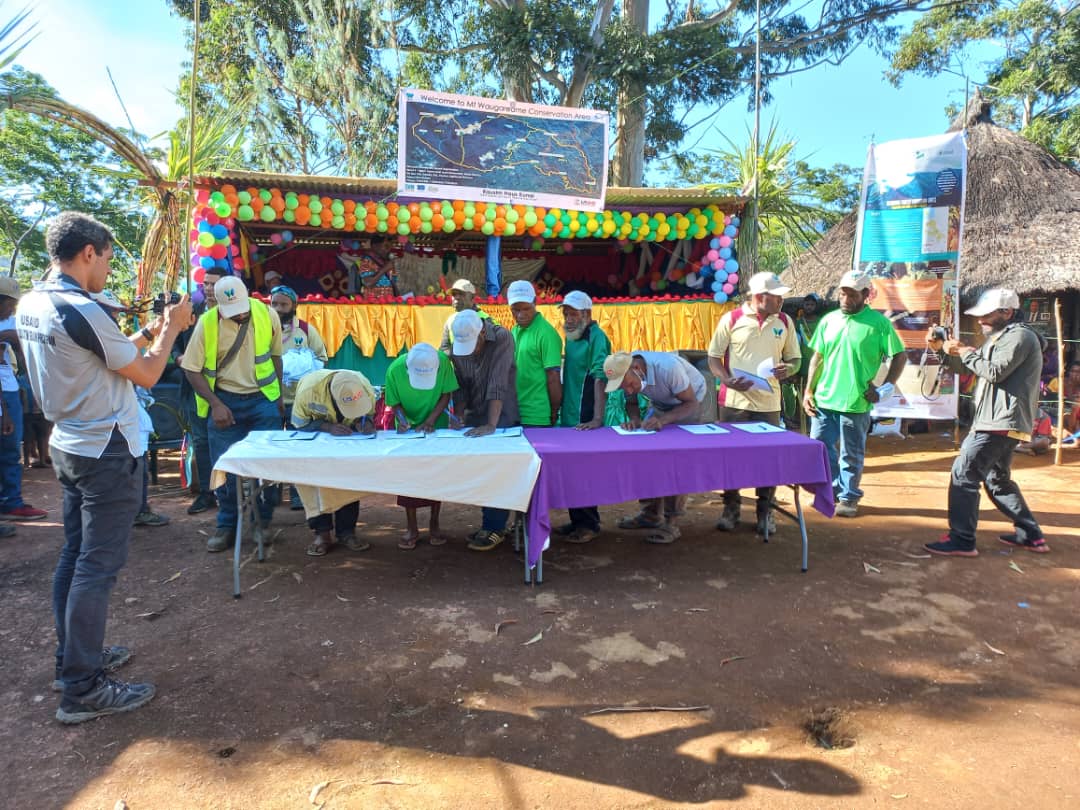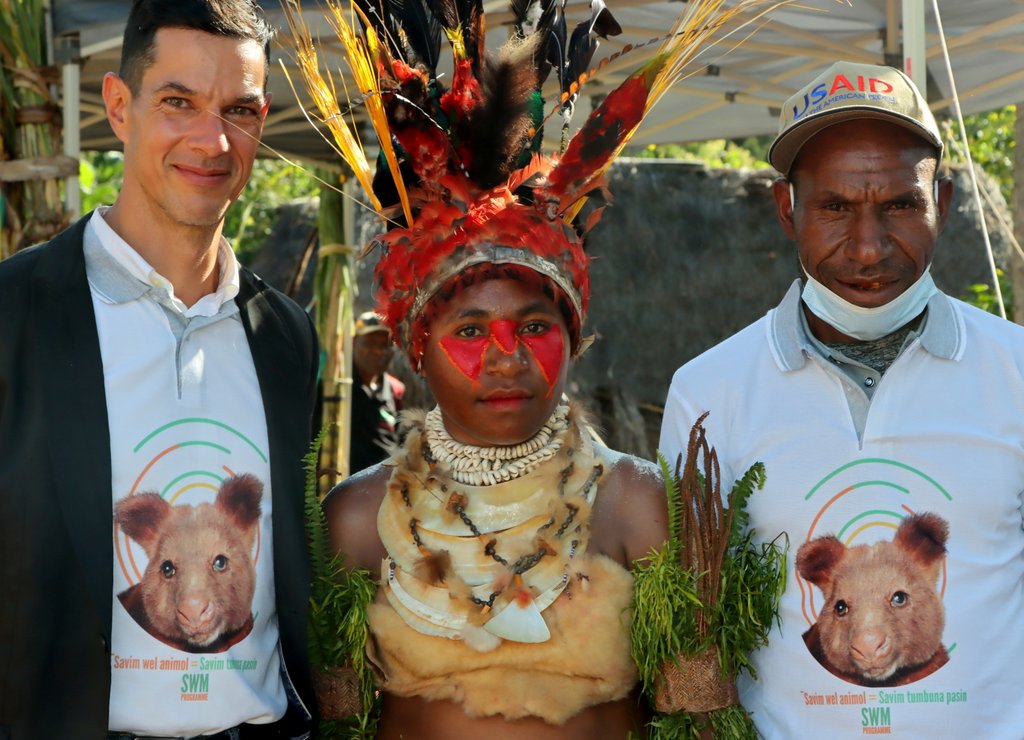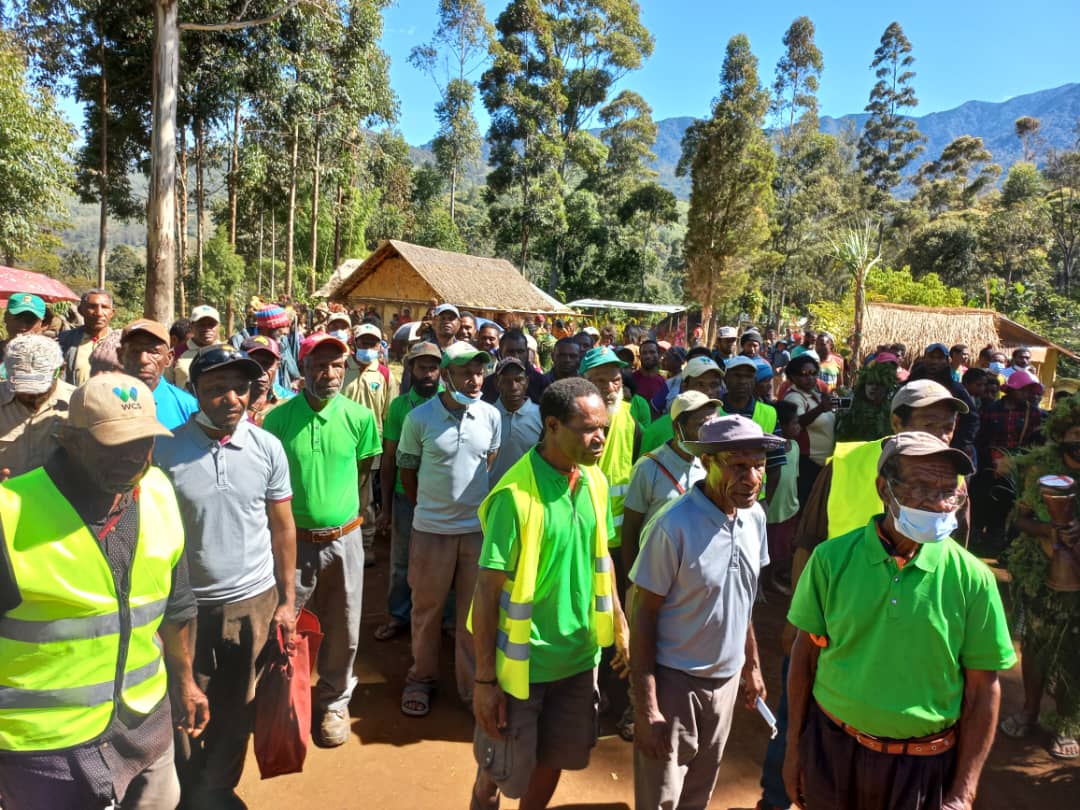The people of Miruma have joined other communities in the Highlands of Papua New Guinea (PNG) to sustainably manage their forest biodiversity for themselves and for the planet.
Seven clans of the Wamiufa tribe, with a total estimated population of over 4000, have today (29.06.22) signed a legally binding contract to protect their forest biodiversity from growing threats of over-exploitation of their forest land and wildlife.
By signing a Conservation Deed through support from the USAID-funded Lukautim Graun Project and EU-funded Sustainable Wildlife Management Programme, the communities have ratified their legal rights to protect Mount Waugareame Conservation Area of 2603 hectares. The site lies at the heart of the forest-clad Bismarck Range, home to more than half of PNG’s biodiversity including endemic species such as the Goodfellow’s tree kangaroo and the Eastern long-beaked echidna.
 Led by a local community-based organisation, WamU5 CBO Inc (Wamiufa), the people of Miruma and Namta, - rich in culture and passion for forest conservation, have worked closely with the Wildlife Conservation Society (WCS) and partners to use their land rights to preserve their unique biodiversity for generations to come.
Led by a local community-based organisation, WamU5 CBO Inc (Wamiufa), the people of Miruma and Namta, - rich in culture and passion for forest conservation, have worked closely with the Wildlife Conservation Society (WCS) and partners to use their land rights to preserve their unique biodiversity for generations to come.
WCS Country Director, Dr Adrian Tejedor, said that WCS has been working with the communities since 2016 when they were approached to help with conservation efforts such as reforestation of degraded lands, and understanding wildlife dynamics in their ancestral land tied to cultural values, and developing conservation livelihood projects.
“Conservation deeds are legally binding agreements that are entered into voluntarily by the community but once signed have the force of law,” he said.
Dr Tejedor said that this was a milestone achievement in customary landowner empowerment in PNG, one of the world’s 17 biologically megadiverse countries and one of the last frontiers for biodiversity conservation. “Apart from the legal protection of their forest, the communities will enact and enforce rules to ensure that the environment is protected along a new inter-province road that will traverse the pristine montane forest and alpine grasslands of the conservation area,” said Dr Tejedor.
“We know that conservation efforts work best when local communities are conscious of the environmental impacts of human activities. Knowing that access to the forest will be managed along the road to balance sustainable development with biodiversity protection will set a benchmark for other communities,” he explained.
 “We have been working closely with partners through the USAID-funded, Lukautim Graun Project to strengthen community livelihood to sustainably promote and support community conservation efforts along the Bismarck Range,” he said“This area is also part of the EU-funded Sustainable Wildlife Management (SWM) Programme, which aims at developing innovative, collaborative, and scalable approaches to conserve wild animals and protect ecosystems, whilst at the same time improving the livelihoods of indigenous peoples and rural communities who depend on these resources,” said Dr Tejedor.
“We have been working closely with partners through the USAID-funded, Lukautim Graun Project to strengthen community livelihood to sustainably promote and support community conservation efforts along the Bismarck Range,” he said“This area is also part of the EU-funded Sustainable Wildlife Management (SWM) Programme, which aims at developing innovative, collaborative, and scalable approaches to conserve wild animals and protect ecosystems, whilst at the same time improving the livelihoods of indigenous peoples and rural communities who depend on these resources,” said Dr Tejedor.
Community leaders and members of Miruma welcomed the assistance provided through the USAID and EU-funded projects.
" It has taken a long process to come this far. For everyone to come to an agreement to give their consent for a conservation area alone is not easy. By developing laws to protect what we have in our forests and on the land, is an achievement,” said Mr. Peter Siune, one of the elders in the Wamiufa Tribe.
“The laws are our own and for it to be recognized by surrounding communities and the government body gives us pride.” “We are very much happy for the signing of agreement among our clans for the established conservation area," he said.
 WCS and WamU5 CBO Inc thank The United States Agency for International Development (USAID) -funded, Lukautim Graun Project and European Union-funded - Sustainable Wildlife Management project for their support in making the aspiration of the people of Miruma a reality and for their contribution to environmental conservation in PNG.
WCS and WamU5 CBO Inc thank The United States Agency for International Development (USAID) -funded, Lukautim Graun Project and European Union-funded - Sustainable Wildlife Management project for their support in making the aspiration of the people of Miruma a reality and for their contribution to environmental conservation in PNG.
Our partners, Cardno International Development, The Nature Conservancy, Care International, Tree Kangaroo Conservation Program, Center for Environmental Law and Community Rights Inc., Food and Agriculture Organization of the United Nations, Center for International Forestry Research, and Cirad - La recherche agronomique pour le développement are proud to be supporting community efforts to protect wildlife and wild places in PNG and will continue supporting them to further build their capacities to enforce customary resource management as well as spreading their message.
WCS PNG also acknowledges and thanks the Conservation and Environment Protection Agency (CEPA) as well as the donors that supported the community conservation efforts along the Bismarck Forest Corridor:
● since 2017, the Government of Australia - DFAT
● since 2018, the Sustainable Wildlife Management (SWM) Programme
● since 2019, the USAID Lukautim Graun Program (LGP)
Download News Release (PDF)